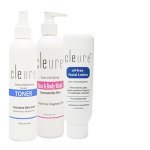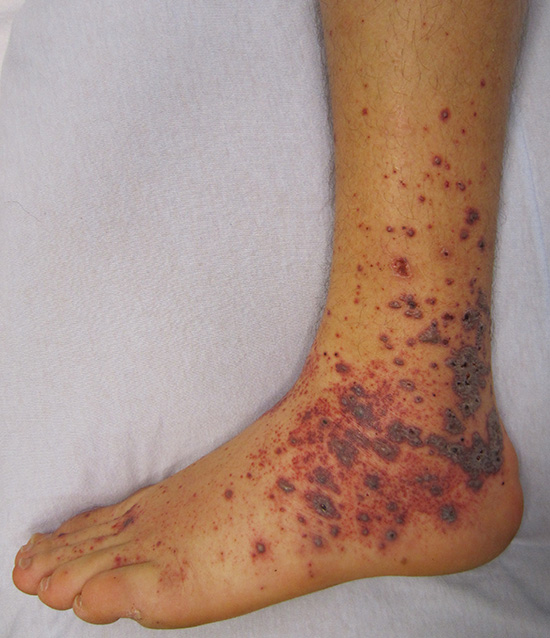Sensitive Skin Survival Guide
What is Causing Your Skin Problems?
It's really no fun to have sensitive skin. If you forget and put on the wrong facial cream, ouch! Your face might be red for days.

Or, worse, you might develop a whole host of allergic reactions including itching, hives, swelling and even skin peeling.
But did you ever think for a minute ...
Why Do I Have Sensitive Skin??
If you've had problem skin for a long time, perhaps you have just learned to live with it. Or maybe you have intensely hypersensitive skin and have even given up on ever finding a solution to your skin problems.
It seems that everyone else has healthy skin, or at least most people. So what causes sensitive skin??
Why is my skin always red and breaking out, while my sister, my dad and my best friend all have normal skin and can use any kind of skin care product that they want to?
Discovering the causes of your sensitive skin can help you a great deal in your daily life. You can nip any potential skin problems right at the bud, before they explode into a rash or outbreak on your face!
For most people, there is no one clear answer because there are many possible causes for sensitive skin.
Taking a Closer Look
In order to learn more about what causes your sensitive skin, you will need to become a bit of a detective! Yes, put on your thinking cap and get out your magnifying glass! :-)
Take a careful look at your daily habits, the foods you eat, the skin care products you use and the environments that you spend time in.
I highly recommend that you keep a brief Sensitive Skincare Journal for at least two weeks, which details everything that you ate, and makes note of any new activities, foods, products or places that you were exposed to. You'll also include exactly what was happening every day with your skin.That way you can look back and put together the pieces to get an idea of what might be causing your skin problems.
You can do this exercise on your own, or with the help of your dermatologist or health practitioner. I am going to list some questions you may want to ask yourself, to help you get started!
When do I Get Skin Rashes and Outbreaks?
- When I use a new skin care product
- When I eat a particular kind of food
- When I eat a new kind of food
- When I take a particular type of medicine
- When I am exposed to perfumes, dyes or chemicals
- When I use a particular kind of laundry detergent
- When I shower with or drink chlorinated water
- When I am in certain kinds of environments or buildings
- When I am stressed out
- When I started puberty or pregnancy or menopause
- All of the above
- None of the above - fill in the blank! ____________
What Symptoms do I Get When my Skin Breaks Out?
- Redness
- Itching
- Peeling
- Burning sensation
- Tingling
- Swelling
- Spots
- Acne
- Flushing or blushing bright red
- All of the above
- None of the above - fill in the blank! ____________
What Seems to Help When my Skin Breaks Out?
- Eating certain foods, or NOT eating certain foods
- Using skincare remedies
- Taking medicine
- Taking herbs or nutritional supplements
- Resting more and de-stressing
- Doing a cleanse
- Stopping all skincare products
- Using less irritating skincare products
- All of the above
- None of the above - fill in the blank! ____________
What Seems to Be the Cause of My Sensitive Skin?
OK, by now if you've been paying attention to your daily habits, the foods you eat, the personal care and skin care products you use and the environments you are in, you may have a better idea of what things will trigger a skin rash or inflammation.
Here are some of the common causes of sensitive skin. Do any of these seem to fit your situation? If you're not sure, get some help from a health professional and see what you can come up with.
Allergies are a very common cause for sensitive skin. Sometimes even food allergies can trigger skin outbreaks. If you think this may be the cause of your skin problems, you may find it helpful to get allergy testing. You can read more about this at our common allergies and symptoms page.Genetic factors also can play a role in sensitive skin. Do a lot of your family members have skin problems? Research has shown that fair skinned people tend to develop sensitive skin more often than people with darker complexions.
Poor digestion and food assimilation can play a role in developing sensitive skin. If you have difficulty digesting your food, not only are you not receiving as much nutrition as your body needs, but also the undigested food tends to create gas, bloating and inflammation in your digestive tract. This kind of inflammation can affect many other body systems including your skin.
Hormonal changes such as puberty, pregnancy, or menopause can bring an increase in acne, skin rashes, dry skin, splotchy patches, or facial redness.
Sluggish elimination can cause skin problems, as the toxins that need to leave the body aren't able to be released through the digestive system, so they are more likely to erupt through the skin.
If you have poor digestion or sluggish elimination, but are in otherwise good health, you may want to try a homemade body cleanse to help restore your body's optimal health.
Thyroid problems have also been known to cause skin problems. I heard a statistic recently that 25% of women have a low thyroid, and I do not know the accuracy of this figure, but I know of many people who have imbalances that cause an overactive or underactive thyroid. Some symptoms of thyroid problems include
- Dry skin
- Fatigue
- Weakness
- Hair loss
- Immune problems
- Depression
- Forgetfullness
- Memory problems
- Insomnia
- Weight gain or loss
- Low body temperature or heat intolerance
- Heavy or light menstrual periods
- Cold or warm hands and feet
If you have some of these symptoms, I recommend you get your hormone and thyroid
levels tested. Thyroid hormones are connected with other hormone levels
in the body.
There are many natural healing
approaches to sensitive skin care that involve modifying your diet,
which is many cases can help reduce or eliminate your symptoms AND
improve the health of your whole body!
Tips for Preventing Skin Eruptions
When you are having a skin outbreak, you'll want to get better as soon as possible. If your skin reaction is severe you might even need medication to get things under control.
Do not change your skin care products in the middle of a skin eruption!
Wait until the swelling and irritation has gone down. For some people, sunlight in moderation can help sensitive skin to heal from an outbreak.
Once your skin is on a more even keel again, you can experiment with making some adjustments in your daily routine to see if this helps prevent future skin outbreaks.
Here are some suggestions which can get you started. These tips are just the beginning, please request our free eBook Clear Any Skin Problem Naturally to learn more.
- Filter your drinking water and your shower and bath water, to avoid absorbing the chlorine. Believe it or not, for some people, this completely clears up their skin problems!
- Increase your intake of Omega 3 fatty acids which can be found in organic, cold pressed oils and fish. Walnuts, flax seeds and salmon are good sources.
I find that even eating plenty of these foods, my sensitive skin needs more. It's not easy to find a good source of pure oils that are not contaminated. I use Omega 3 DHA Fish Oil which is the purest and most affordable of the quality fish oils I've found. Getting enough Essential Fatty Acids in your diet will make your skin soft and healthy from the inside out! - Increase your intake of raw vegetables and fruits, or supplement your diet with enzymes to reduce inflammation and improve digestion. If eating raw veggies isn't very appealing, try juicing or making green smoothies ... blender drinks with water, 60% fruit and 40% fresh greens. These are delicious!
- Consider supplementing your diet with probiotics (friendly bacteria) to improve digestion and elimination, or with foods such as yogurt and sauerkraut which contain beneficial bacteria.
- Avoid sugar and alcohol which deplete the immune system and create inflammation in the body. These are never helpful when you have skin problems!
- Try giving up coffee for a month, and see if your skin clears up. Some people find great success with this one tip!
Product Tips for Sensitive Skin
Here are some tips to help you avoid the ingredients that are most irritating for problem skin. If you have hypersensitive skin, or very dry sensitive skin, I recommend you most definitely should avoid all of these skin care ingredients.
- Avoid using products with added fragrance. Fragrance is one of the top five allergens and contains many chemicals which are toxic to the body and to the brain. Most skin care and personal care products, cosmetics, shampoos, soaps, laundry detergents, air fresheners, and cleaning products contain synthetic fragrance.
Yes, I know that that is a lot of work, to check the ingredients on all the labels of everything you use! After a while this will become second nature for you, and your sensitive skin will appreciate the care you take to create a more non-toxic lifestyle.
If you'd like to save some time, I've put together some of the top safe skin care products that are BOTH safe and effective. - Avoid formaldehyde-based preservatives which can cause sensitive skin reactions. Some examples include DMDM hydantoin, diazolidinyl urea, imidazolidinyl urea, and quaternium-15.
- Avoid Sodium Lauryl Sulfate (also know as SLS) which is irritating to sensitive skin and especially to hypersensitive skin. SLS is a foaming agent found in most shampoos and many other personal care products including facial cleansers toothpastes. Read our list of other skin care ingredients that cause inflammation.
- Avoid botanicals or essential oils, which can also cause allergic reactions even though they are natural. Choose truly hypoallergenic products that are free from botanicals and from allergic or toxic chemicals.
Not all hypoallergenic products are alike, and in fact I was shocked to learn that MOST of the brand name, well known hypoallergenic product lines actually contain ingredients that can cause skin rashes, skin irritation or other health hazards.
I've only managed to find only one line of safe hypoallergenic products that contains no irritating toxins in their ingredients, and that is also free of botanicals and plant allergens.
Home > Sensitive Skin Survival Guide









New! Comments
Share your thoughts about what you just read! Leave me a comment in the box below.